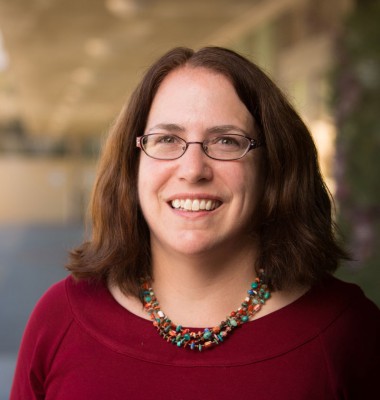 Professor Katie Purvis-Roberts
Professor Katie Purvis-Roberts
Claremont, Calif. (June 14, 2017)—Pitzer College Professor Katie Purvis-Roberts will deliver a Jefferson Science Fellows Distinguished Lecture at the National Academy of Sciences in Washington DC on June 20. Purvis-Roberts, a Jefferson Science Fellow, will present “Particles, Particles Everywhere: What Is in the Air We Breathe?”, a talk that explores particulate matter air pollution.
Part of the Jefferson Science Fellows Distinguished Lecture Series, this address sheds light on the impact of airborne particulate matter (PM). Purvis-Roberts, a professor of chemistry and environmental science at Pitzer, Claremont McKenna and Scripps Colleges’ W.M. Keck Science Department, is an expert in particulate matter air pollution, which consists of extremely small particles. PM is a major environmental and health issue—some particles are so small they can pass directly from the lungs into the bloodstream.
“Particles, Particles Everywhere” will focus on two sources of PM: agricultural and nuclear testing. Agriculture is a primary source of air pollution in many areas, including California’s Central Valley and the Salt Lake City area. Gas from amines—organic compounds derived from ammonia—are emitted into the atmosphere from animal husbandry operations, but the mechanism for how these gases react in the atmosphere to form particles is not fully understood. Field studies were done on a dairy in the central valley of California and a poultry farm in Bowling Green, KY, followed by more theoretical studies in an environmental chamber. This has enabled a better understanding of how the PM forms from agricultural emissions and provides insights for controlling their formation.
In nuclear testing, radioactive particles form during the detonation of nuclear weapons and can be picked up in the wind, forming a particularly dangerous form of PM air pollution. A field study was done on the Semipalatinsk Nuclear Test Site in Kazakhstan, where above-ground nuclear tests were done, to understand potential human exposure from blowing dust. Current research is focused on understanding how PM forms in the atmosphere from various pollution sources and how to better control it.
Purvis-Roberts was awarded a 2016-17 Jefferson Science Fellowship (JSF) to work on environmental issues—mainly in countries belonging to the Asia-Pacific Economic Cooperation (APEC) forum—at the US State Department’s Bureau of East Asian & Pacific Affairs in the Office of Economic Policy. One of only 12 scientists, engineers or physicians to be selected for a JSF last year, Purvis-Roberts now oversees the Office of Economic Policy’s work in APEC’s Policy Partnership for Women and the Economy working group, which aims to advance the economic integration of women in the Asia-Pacific region and increase the number of women in science, technology, engineering and math (STEM) across APEC economies. She also coordinates the APEC work of the Energy Working Group, Automotive Dialogue, Mining Task Force, Chemical Dialogue, and Policy Partnership for Science and Technology for the office.
At the State Department, Purvis-Roberts is also creating a workshop that helps representatives from APEC nations assess the health and environmental impacts of different energy sources. This is part of her focus on regional energy policy coordination. Last year, she helped organize the State Department’s international Our Ocean Conference.
Purvis-Roberts is the co-author of two environmental chemistry textbooks, Chemistry in Context for non-majors and Chemistry of the Environment for majors. She has also written extensively about the perceptions of risk and environmental impacts of nuclear testing in Kazakhstan. In 2013 she was awarded a Henry Dreyfus Teacher-Scholar Award, which supports young faculty in the chemical sciences who are committed to teaching and conducting research with undergraduate students. Purvis-Roberts earned a BA in chemistry from Westmont College, a PhD in physical chemistry from Princeton University.